2020九年级英语上册 Unit 4 Amazing science词汇精讲精练仁爱版
2020九年级英语上册 Unit 4 Amazing science词汇精讲精练仁爱版

Unit 4 Amazing science词汇精讲精练词汇精讲1. invention(1)invention作名词,意为“发明;创造;虚构;发明物”。
例如:Necessity is the mother of invention.需要是发明之母。
The whole thing is an invention of a newspaper.整件事都是一家报纸虚构的。
The machine is his own invention.这台机器是他自己的发明物。
(2)invent是 invention的动词形式,意为“发明;创造;虚构”。
例如:Edison invented the light bulb. 爱迪生发明了电灯。
The whole story was invented. 整个故事是虚构的。
【拓展】invent和discover辨析:(1)invent 意为“发明,发明之物”指“从无到有”。
例如:Alexander Graham Bell invented the telephone in 1876.亚历山大·格雷厄姆·贝尔在1876年发明了电话。
(2)discover 意为“发现”,指“本来就已经存在,但不为人知”的事物。
例如:Columbus discovered America in 1492. 哥伦布在1492年发现了美洲。
2. thought(1)thought作名词,意为“思想;想法;见解;看法;主意”。
例如:The old man was lost in thought and did not hear us come in.这个老人凝神沉思,没有听见我们进来。
Learn new culture, create new thought, establish new idea and reach new success. 学新文化,创新思想,立新观念,铸就新成功!Don’t give it another thought.不要再想了。
九年级英语上册 Unit 4 Amazing Science Topic 2 I’m excited

Unit4 Topic2一、重点词汇:1. be used for +ving 被用做……2. come true 实现3. It’s said that 据说4. during/in one’s life 某人一生5. be known as 以……(身份)而著名6. know/say for certain 确切知道/肯定地说7. all the time 一直、总是8. no longer=not…any longer 不再(no more, not…any more)9. as long as 只要10. as far as 就……,尽……11. make a great contribution 对……作出巨大贡献12. the rest of the time 在其余地时间里13. at any time 在任何时候二、重点句型:1. Because I’m not allowed to play computer games.因为我不可以玩电脑游戏。
allow “允许、准许”的意思。
常用于以下几种形式:(1) allow +n./prep 如:We can’t allow such a thing.我们不容许这种事情发生。
(2) allow sb. to do sth 允许某人做某事如:She allowed me to go fishing.她允许我去钓鱼。
(3) allow +doing sth 允许做某事如:We don’t allow smoking in the reading-room.我们不允许在阅览室吸烟。
(4) be allowed to do sth 如:被允许做某事The students are allowed to play games on the play ground after sch ool.放学后学生们被准许在操场上做游戏。
2. How do you say this in English?这用英语怎么说?其意思与What’s this in English相同。
初三上册英语AmazingScience要点精讲:Topic2

初三上册英语AmazingScience要点精讲:Topic2分开小节整理作为英语学习的基础是不可懈怠的,初三上册英语AmazingScience要点已经为大家整理出来,希望对大家学习有帮助! Hi, Maria! A wonderful movie will be shown tonight. Shall we go to watch it? 玛丽亚,你好!一场精彩的电影将在今晚上映。
我们一起去看好吗? Great! What’s it about? 太好了!它是关于什幺内容的? It’s about life in space. 有关太空生活的。
That sounds exciting. 听起来很令人兴奋。
Yes. All the people travel by spaceship in the movie, and they can visit planets like Mars. 是的。
在电影里所有的人都乘宇宙飞船旅行,他们还能访问像火星一样的星球。
Really? Kangkang, do you think people will live on Mars in the future? 真的吗?康康,你认为人类将来能够在火星上生活吗? Yes. I think we will live in space one day. Houses, schools and hospitals will be built on Mars. We will be able to do anything that can be done on the earth. 是的,我认为有一天我们会在太空生活。
房屋、学校、医院都将被建立在火星上。
我们将能做在地球上能做的任何事情。
What fun! I can’t wait. 多幺有趣啊!我等不及了。
九年级英语上册 Unit 4 Amazing Science Topic 1 When was it
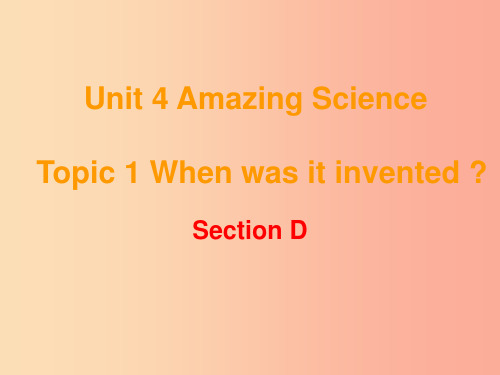
however, this method didn’t work well when the
Retell it !
根据首字母提示,完成短文。
Thanks to GPS, we can exactly know w h__e_re__we are now. GPS is like a man-made “star”. It can be u_s_e_d_ in
any place and any weather condition to find out our
• What’s it used for? • It’s used for communicating easily. • What’s it made of? • It’s made of plastic and metal. • Where was it invented? • It was invented in America. • When was it invented? • It was invented in 1973.
weather was bad. So GPS is a great invention that can
help humans to better ex__p_lo_r_e___ our planets.
Grammar
Passive Voice (Ⅱ)
The radio was invented by Guglielmo Marconi in 1895.
仁爱版初三英语上册Unit 4 Amazing science词汇精讲精练-教学文档

Unit 4 Amazing science词汇精讲精练词汇精讲1. invention(1)invention作名词,意为“发明;创造;虚构;发明物”。
例如:Necessity is the mother of invention.需要是发明之母。
The whole thing is an invention of a newspaper.整件事都是一家报纸虚构的。
The machine is his own invention.这台机器是他自己的发明物。
(2)invent是invention的动词形式,意为“发明;创造;虚构”。
例如:Edison invented the light bulb. 爱迪生发明了电灯。
The whole story was invented. 整个故事是虚构的。
【拓展】invent和discover辨析:(1)invent 意为“发明,发明之物”指“从无到有”。
例如:Alexander Graham Bell invented the telephone in 1876.亚历山大·格雷厄姆·贝尔在1876年发明了电话。
(2)discover 意为“发现”,指“本来就已经存在,但不为人知”的事物。
例如:Columbus discovered America in 1492. 哥伦布在1492年发现了美洲。
2. thought(1)thought作名词,意为“思想;想法;见解;看法;主意”。
例如:The old man was lost in thought and did not hear us come in.这个老人凝神沉思,没有听见我们进来。
Learn new culture, create new thought, establish new idea and reach new success.学新文化,创新思想,立新观念,铸就新成功!Don’t give it another thought.不要再想了。
九年级上册英语四单元Topic3知识点储备:AmazingScience

九年级上册英语四单元Topic3知识点储备:AmazingScience九年级上册英语四单元Topic3知识点是本单元的最后一个小节,重点就是能够在听、说、读、写中正确运用一般过去时的被动语态,行动起来吧~ Section A (Michael and Kangkang are in the Science Museum.)( 迈克尔和康康在科学博物馆里。
) Kangkang, who is the first Chinese to travel into space? 康康,谁是中国太空旅行第一人呢? Yang Liwei. He is our national hero who traveled around the earth in Shenzhou Ⅴfor 21 hours in 2003. China is the third nation that sent a person into space. 杨利伟。
他是在2003年乘坐神州五号围绕地球21小时的民族英雄。
中国成为了第三个将人送入太空的国家。
Wonderful! All of you must be very proud. 太好啦!你们一定都很自豪吧! Of course we are. What’s more, we have launched another four spaceships in the past few years. 我们当然自豪啦。
另外,在过去几年里,我们已经发射了另外四艘宇宙飞船。
That’s great! It proves that China has made great progress in its space industry. 听起来真棒!这表明中国在航天工业方面已经取得了巨大进步。
That’s right. I’m sure that China will send more spaceships into space. 对。
发现科学的精髓——Unit4AmazingScience教案
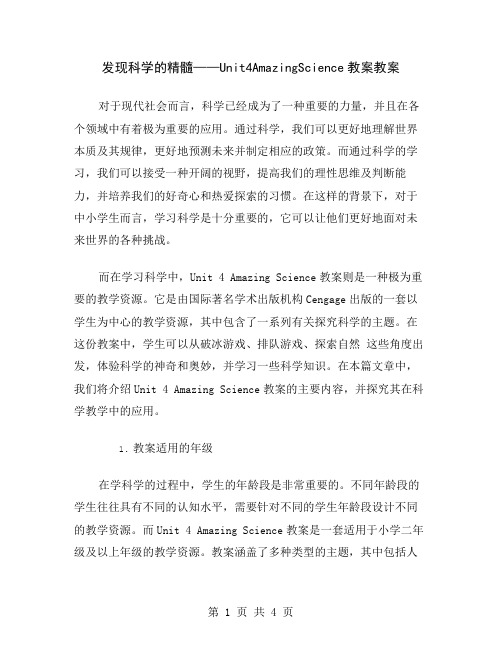
发现科学的精髓——Unit4AmazingScience教案教案对于现代社会而言,科学已经成为了一种重要的力量,并且在各个领域中有着极为重要的应用。
通过科学,我们可以更好地理解世界本质及其规律,更好地预测未来并制定相应的政策。
而通过科学的学习,我们可以接受一种开阔的视野,提高我们的理性思维及判断能力,并培养我们的好奇心和热爱探索的习惯。
在这样的背景下,对于中小学生而言,学习科学是十分重要的,它可以让他们更好地面对未来世界的各种挑战。
而在学习科学中,Unit 4 Amazing Science教案则是一种极为重要的教学资源。
它是由国际著名学术出版机构Cengage出版的一套以学生为中心的教学资源,其中包含了一系列有关探究科学的主题。
在这份教案中,学生可以从破冰游戏、排队游戏、探索自然这些角度出发,体验科学的神奇和奥妙,并学习一些科学知识。
在本篇文章中,我们将介绍Unit 4 Amazing Science教案的主要内容,并探究其在科学教学中的应用。
1.教案适用的年级在学科学的过程中,学生的年龄段是非常重要的。
不同年龄段的学生往往具有不同的认知水平,需要针对不同的学生年龄段设计不同的教学资源。
而Unit 4 Amazing Science教案是一套适用于小学二年级及以上年级的教学资源。
教案涵盖了多种类型的主题,其中包括人类身体、恐龙、植物生长等,能够充分满足不同年级段学生的需求,促进他们对科学的探究和理解。
2.教案的重点内容Unit 4 Amazing Science教案是一套非常全面的科学教学资源,其中融入了很多现代教育科技的手段和方法。
教案中的主要内容如下:2.1.破冰游戏破冰游戏是科学教学中非常重要的环节,能够有效促进学生的互动及学习效果。
在Unit 4 Amazing Science教案中,设计了一系列有趣的破冰游戏,能够帮助学生在轻松愉快的氛围中接受科学知识,消除他们的压力并激发他们的兴趣。
九年级上册英语AmazingScience要点精讲:Topic1

九年级上册英语AmazingScience要点精讲:Topic1英语学习一定要注意对基础的培养,英语老师也要注重同学们对基础的掌握,九年级上册英语AmazingScience要点整理给大家,请老师参考并提出宝贵意见。
Section A Jane, why are you unhappy? 简,你为什幺不高兴? Because I was not allowed to play computer games last night. 因为昨天晚上他们不让我玩电脑游戏。
It’s bad for your health if you spend too much time on them. 如果你在那上面花的时间太多,会危害你的健康。
Maybe you’re right. 也许你是对的。
(Kangkang shows a model to Jane.)(康康给简展示了一个模型。
) Look at this. 看这个。
A model rocket! Who made it? 哇!火箭模型!谁制作的? It was made by me. 我制作的。
Wow! What’s it made of? 哇!它是用什幺制作的? It’s made of metal. Do you know what a rocket is used for? 它是用金属做的。
你知道火箭是用来做什幺的吗? Sure. It’s used for sending satellites or spaceships into space. 当然知道。
它是被用来发射人造卫星或宇宙飞船的。
You’re right. I’ve learned a lot about spaceships from Mr. Brown and then I made this model rocket. I wish I could go into space some day. 你说得。
仁爱英语九年级上册unit4重点短语和所对应句子Amazingscience
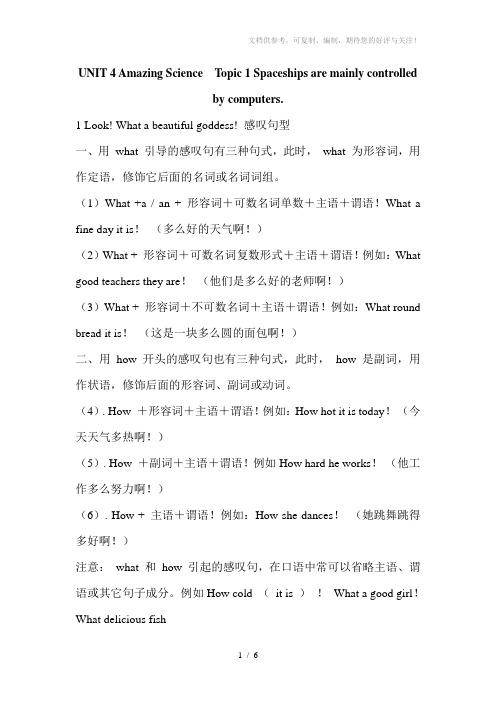
UNIT 4 Amazing Science Topic 1 Spaceships are mainly controlledby computers.1 Look! What a beautiful goddess! 感叹句型一、用what 引导的感叹句有三种句式,此时,what 为形容词,用作定语,修饰它后面的名词或名词词组。
(1)What +a / an + 形容词+可数名词单数+主语+谓语!What a fine day it is!(多么好的天气啊!)(2)What + 形容词+可数名词复数形式+主语+谓语!例如:What good teachers they are!(他们是多么好的老师啊!)(3)What + 形容词+不可数名词+主语+谓语!例如:What round bread it is!(这是一块多么圆的面包啊!)二、用how 开头的感叹句也有三种句式,此时,how 是副词,用作状语,修饰后面的形容词、副词或动词。
(4). How +形容词+主语+谓语!例如:How hot it is today!(今天天气多热啊!)(5). How +副词+主语+谓语!例如How hard he works!(他工作多么努力啊!)(6). How + 主语+谓语!例如:How she dances!(她跳舞跳得多好啊!)注意:what 和how 引起的感叹句,在口语中常可以省略主语、谓语或其它句子成分。
例如How cold (it is )!What a good girl!What delicious fishin Shenzhou V for 21 hours.4 Oh, Kangkang, what a large crowd! 感叹句实现梦想持续8 So I advise you to study harder to make9 There is computers are very useful in technology and business..doctors can find diseases easily and solve other problems.12 In factories, robots controlled by computers can do work that13 Since the Internet people's lives at home have changed, too.出现the Internet, people can do shopping and do business at home.15 writing letters on paper, people communicate by16 If we play computer games too much, we won't study well or get条件状语从句18 Verb + object + complement\n 动词+宾语+补语\nUnit4 Topic 2 When was it developed?5 I wish I could go into space some day. 虚拟语气实现and some other animals.10 As you know, there is DNA in most living things,human beings.be part of our lives.robots can think for themselves, problems may appear.want to be our servants, but our masters.the weather wasgood and the stars could be seen.23 To his surprise, when he was using the cellphone, he was caught byUnit4 Topic 3 We will live in space one day.在将来3 believe there are aliens I see them with my own eyes.基础技能在舞台上一般说来11 But the were quite bad during the journey.flight to explore Mars.。
九年级英语上册Unit4Amazingscience词汇精讲精练仁爱版(2021年整理)

九年级英语上册Unit 4 Amazing science词汇精讲精练(新版)仁爱版编辑整理:尊敬的读者朋友们:这里是精品文档编辑中心,本文档内容是由我和我的同事精心编辑整理后发布的,发布之前我们对文中内容进行仔细校对,但是难免会有疏漏的地方,但是任然希望(九年级英语上册Unit 4 Amazing science词汇精讲精练(新版)仁爱版)的内容能够给您的工作和学习带来便利。
同时也真诚的希望收到您的建议和反馈,这将是我们进步的源泉,前进的动力。
本文可编辑可修改,如果觉得对您有帮助请收藏以便随时查阅,最后祝您生活愉快业绩进步,以下为九年级英语上册Unit 4 Amazing science词汇精讲精练(新版)仁爱版的全部内容。
Unit 4 Amazing science词汇精讲精练词汇精讲1. invention(1)invention作名词,意为“发明;创造;虚构;发明物”。
例如: Necessity is the mother of invention。
需要是发明之母。
The whole thing is an invention of a newspaper。
整件事都是一家报纸虚构的.The machine is his own invention。
这台机器是他自己的发明物。
(2)invent是 invention的动词形式,意为“发明;创造;虚构"。
例如:Edison invented the light bulb。
爱迪生发明了电灯.The whole story was invented。
整个故事是虚构的。
【拓展】invent和discover辨析:(1)invent 意为“发明,发明之物”指“从无到有".例如:Alexander Graham Bell invented the telephone in 1876。
亚历山大·格雷厄姆·贝尔在1876年发明了电话.(2)discover 意为“发现”,指“本来就已经存在,但不为人知”的事物。
Unit 4 Topic 3-Section C课文讲解-仁爱版英语九年级上册
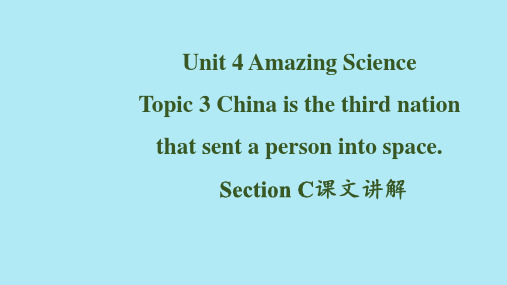
With the help of computers, doctors can find diseases easily and solve other problems.
译文:在电脑的帮助下,医生能够轻而易举地发现疾病并解决其他问题。
with the help of… 在……帮助下 e.g. With the help of my classmates, my spoken English got
除了最后一个问题没答外,其余问题他都答了。
except后接名词、代词、动名词和动词原形,这时except=but; 但except后跟副词、介词短语时,不能用but代替。 e.g. The window is never open except in summer.
这扇窗户从来不开,除夏季外。 He did nothing except/ but clean the house. 他只是打扫了房子。
instead of 代替
The whole world is connected. The Internet is making the world smaller, like a village. 译文:整个世界都联系在一起。网络让地球变得更小,像个村子一样。
connect v. 连接
connection n. 关系,联系
except 除……之外(不再有) e.g. We all passed the exam except Tom.
我们都通过了考试,汤姆除外。(整体中……汤姆一人不及格) except前几乎总有all、any、every、no及其复合词等词。 e.g. He answered all the questions except the last one.
2022-2023学年仁爱版九年级英语(上学期)Unit4知识点汇总课件
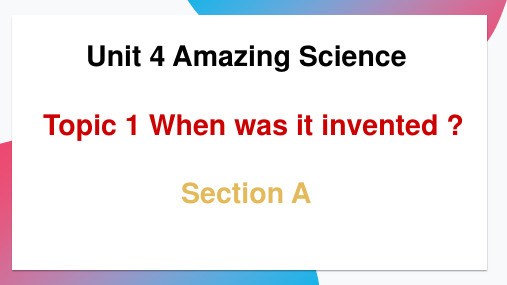
A .Camera B. Lift C. MP3 player
( B)5 .We should spend more time ___because it’s too
important.
A .to learn English B. learning English C. in English
3. A Journey to West _is__sh_o_w_n__ (show) on CCTV
every summer. 4.On Christmas Day, children wake up early
and can’t wait _t_o_o_p_e_n (open) the boxes of presents. 5. We’ll have a chance _t_o_s_e_e (see) the flower show this weekend.
(C )2.We all know that paper ___wood.
A. is made of B. is made into C. is made from
( C )3.This kind of machine ___in 2006.
A. is invented B. is made C. was invented
1.My mother allows me to use her cellphone.(改为被动语 态) I _a_m___ a_l_lo_w__e_d __t_o__ use my mother’s cellphone.
2.A rocket is used for launching satellites and spaceships. (就画线部分提问)
仁爱版初三英语上册Unit 4 Amazing Science《定语从句的用法》知识梳理

定语从句的用法【概念引入】欣赏含有定语从句的名言:Laughter is the sun that drives winter from the human face.笑是太阳||,它从人们的脸上赶走冬天||。
Don’t trust the first sign that you see.不要相信你看见的第一个迹象||。
All is not gold that glitters.发光的未必都是金子||。
Nothing is impossible to the man who has will.世上无难事||,只怕有心人||。
God helps those who help themselves.自助者天助||。
【用法讲解】一、定语从句的功用和结构在复合句中||,修饰某一名词或代词的从句叫做定语从句||。
被定语从句修饰的词叫做先行词||,定语从句必须放在先行词之后||。
引导定语从句的关联词有关系代词和关系副词||。
This is the present that he gave me for my birthday.这是他给我的生日礼物||。
Do you know everybody who came to the party?你认识来宴会的每一位吗?This is the place where Chairman Mao once lived.这是毛主席曾经居住的地方||。
二、各个关系代词和关系副词的具体用法1. who 指人||,在定语从句中作主语或宾语||。
I prefer singers who can write their own lyrics.我更喜欢能写自己歌词的歌唱家||。
These are musicians who make us happy.这些是能让我们高兴的音乐家||。
People who eat a balanced diet are healthier.平衡饮食的人是健康的||。
探索科学的奥秘——Unit4AmazingScience教案

探索科学的奥秘——Unit4AmazingScience教案。
这个单元是关于探索科学的奥秘。
它让学生们探索了许多不同的科学领域和概念。
它讨论了人类如何通过观察和实验来发现自然规律。
这样的实践是科学思维的核心,也是人类探索自然世界的方法。
通过这个单元,我看到了科学研究的过程,这是一种发现和创新的过程。
教案还介绍了不同的科学领域,包括生物学、化学、物理学、地球科学和天文学。
这些科学领域都涉及不同的研究对象和方法。
对于我来说,在了解这些领域的同时,就意味着我看到了更多的惊奇之处。
例如,在化学领域,我惊讶于不同的化学元素能够创造多种多样的化合物,而在天文学领域,我着迷于宇宙的宏伟和神秘。
这些和其他的科学领域都加深了我的好奇心,使我着迷于科学的奥秘和探索自然的无限可能。
在整个教案中,我学到了很多不同的概念和实验。
我了解了细胞、DNA、原子、分子、电磁波、地震和星系等基本知识。
我也学到了一些实验方法,如如何进行实验,如何收集数据以及如何对数据进行分析。
这些实验让我更深入地了解科学的本质,以及如何将科学应用于解决现实问题。
除了科学知识,这个单元还推广了科学思想。
它教导学生们如何用赤子之心来思考科学问题。
通过设想和探索,学生们能够推断出解决问题的可能方法。
这样的科学思维模式能够帮助他们发现问题,创新和改进。
这是培养创新思维的重要途径,也是培养未来科学家的方法。
在整个教案中,我感到最棒的是它鼓励学生积极地参与其中,尤其是在实验环节。
学生们肯定会对这些实验产生浓厚的兴趣。
通过这些实验,学生们能够更好地了解科学。
实验能够让他们积极思考,和其他同学合作完成实验。
这样的互动使学校变成了一个科学实验室,使学生们更易于学习和理解科学。
而这个单元帮助学生们理解科学并推广科学思想,也让他们更有信心地在未来的生活中探索科学的未知领域。
总而言之,我感到Unit 4 Amazing Science教案是我所见过的最棒的科学教材之一。
它涵盖了许多不同的科学领域和概念,给学生们提供了广阔的科学视野。
都昌县三中九年级英语上册 Unit 4 Amazing Science知识点 仁爱版

Unit 4 Topic1 When was it invented? Ⅰ.词组归纳:be(not) allowed to do sth. (没有)被允许做某事show sth. to sb.=show sb. sth. 把某物展示给某人看①be made by sb. 被……(某人)制作②be made of 用……制造的(可看出原材料)③be made from 用……制造的(不可看出原材料)④be made in 在…….(地点)制造⑤be made into 被制成…….send sth. to sp. 、sb. 发送某物给某人\某地realize…=make … come true 实现…spend sometime/some money (in)doing sth. 花费时间\金钱做某事spend sometime/some money on sth. 在。
上花费时间\金钱some knowledge about sth. 一些关于…….的知识8.①be used to do sth =be used for doing sth. 被用做某事②be/get used to doing sth. 习惯于做某事used to do sth. 过去常常做某事③be used as…某物被用作……./被作为。
使用9.It is said that…据说……10.during one’s life 在某人的一生中11.go this way 走这边12.make tents 搭帐篷e about 产生15.a few simple steps 一点简单的步骤16.be discouraged by 被……阻挡17.brainstorm for ideas 集思广益18.make a detailed drawing 画下具体的图画19.share sth. with sb. 和某人分享某物21.the rest of the time 剩余的时间22.a man-made satellite 一颗人造卫星23.the shape of the earth 地球的形状Ⅱ重点句子:1.The radio was invented by Guglielmo Marconi in 1895. 收音机是在 1895 年马可尼发明的.2.When was the digital camera developed? 数码相机是什么时候研发的?It was developed in the 1970s. 它发展于 20 世纪 70 年代.3.Where was it developed? 它在哪发展的?It was developed in Japan. 它在日本得以发展.4.What is a rocket used for? 火箭被用来做什么?It is used for sending satellites or spaceships into space.它被用作发射卫星或宇宙飞船到太空.5.I wish I could go into space some day. 我希望有一天我能去太空.6.I hope your dream will come true. 我希望你梦想成真.7.It’s said that he invented more than two thousand things during his life.据说他一生中发明了两千多项东西.8.Inventing is interesting and exciting and everyone can be an inventor.发明是有趣且激动人心的,每个人都能成为发明家.Ⅲ. 语法 (被动语态)①构成法:1.一般现在时的被动语态构成:is / am / are + 及物动词的过去分词Our classroom is cleaned every day.2.一般过去时的被动语态构成:was / were + 及物动词的过去分词A new shop was built last year.3.现在完成时的被动语态构成:has / have + been +及物动词的过去分词Many man-made satellites have been sent up into space by many countries.4.一般将来时的被动语态构成:will/shall+ be + 及物动词的过去分词A new hospital will be built in our city.5.含有情态动词的被动语态构成:情态动词+ be + 及物动词的过去分词Young trees must be watered often.6.现在进行时的被动语态构成:am / is / are + being +及物动词的过去分词Eg : They are planting trees over there. →Trees are being planted over there bythem.7.不定式的被动语态:to + be + 及物动词的过去分词There are two books to be read. →There are twenty more trees to be planted.②注意事项:不及物动词无被动语态.2.感官动词或使役动词使用省略 to 的动词不定式,主动语态中不带 to ,但变为被动语态时,须加上 to 。
- 1、下载文档前请自行甄别文档内容的完整性,平台不提供额外的编辑、内容补充、找答案等附加服务。
- 2、"仅部分预览"的文档,不可在线预览部分如存在完整性等问题,可反馈申请退款(可完整预览的文档不适用该条件!)。
- 3、如文档侵犯您的权益,请联系客服反馈,我们会尽快为您处理(人工客服工作时间:9:00-18:30)。
Unit 4 Amazing science词汇精讲精练词汇精讲1. invention(1)invention作名词,意为“发明;创造;虚构;发明物”。
例如:Necessity is the mother of invention.需要是发明之母。
The whole thing is an invention of a newspaper.整件事都是一家报纸虚构的。
The machine is his own invention.这台机器是他自己的发明物。
(2)invent是 invention的动词形式,意为“发明;创造;虚构”。
例如:Edison invented the light bulb. 爱迪生发明了电灯。
The whole story was invented. 整个故事是虚构的。
【拓展】invent和discover辨析:(1)invent 意为“发明,发明之物”指“从无到有”。
例如:Alexander Graham Bell invented the telephone in 1876.亚历山大·格雷厄姆·贝尔在1876年发明了电话。
(2)discover 意为“发现”,指“本来就已经存在,但不为人知”的事物。
例如:Columbus discovered America in 1492. 哥伦布在1492年发现了美洲。
2. thought(1)thought作名词,意为“思想;想法;见解;看法;主意”。
例如:The old man was lost in thought and did not hear us come in.这个老人凝神沉思,没有听见我们进来。
Learn new culture, create new thought, establish new idea and reach new success.学新文化,创新思想,立新观念,铸就新成功!Don’t give it another thought.不要再想了。
(2)think作动词,是动词think的过去式和过去分词形式,意为“想,思考,考虑”。
例如:It used to be thought that the earth was flat. 过去人们认为地球是扁平的。
I thought you were a teacher. 我以前认为你是一名教师。
I do not think that need be thought about. 我认为不必考虑那件事。
3. imaginationimagination作名词,意为“想象;想象力;幻想”。
例如:These plans is a complete failure of imagination.这些计划毫无想象力。
A sketch can stimulate one’s own imagination.图形能促进一个人的想象力。
You didn’t really see a ghost, it’s only imagination.你并没有真地看见鬼,这仅仅是幻想。
【拓展】imagine作动词,意为“想象”。
imagine 是及物动词,后面可跟名词,代词,动名词和从句作宾语。
例如:We cannot imagine life without any hardships. 我们不能想象没有任何坎坷的生活。
I can imagine the scene clearly in my mind. 我仍然能很清晰地想象此番情景I once imagined him a thin tall man. 我曾以为他是个高高的瘦瘦的人。
She always imagine it an easy thing. 她总是设想这事轻而易举。
I can’t imagine myself teaching in front of that many people.我不能想象自己在那么多人面前教书。
Can you imagine Tom’s cooking the dinner himself? 你能想象汤姆居然亲自下厨做饭?Mr. Smith couldn’t imagine what had ha ppened at all.史密斯不能想到发生了什么事。
I imagine (that) you are very tired. 我猜想你已经很累了吧。
4. mark(1)mark作名词,意为“记号;痕迹;分数;商标”。
例如:He makes a mark on the tree.他在树上做了个记号。
War has left its mark on the country.战争给该国留下了不可磨灭的痕迹。
He attained a good mark in the examination.他在考试中得到好分数。
Look at the mark on the goods.看产品上的商标。
(2)mark作动词,意为“打分;留意;标记”。
例如:They have got a pile of exam papers to mark.他们有一大堆试卷要打分。
Viola did not fail to mark the words of the old song.薇奥拉果然留意了这支古老歌曲的词儿。
Mark all of the large cities on the map.在地图上把所有大城市标记出来。
5. describedescribe作动词,意为“描述;说成;形容”。
其名词形式为description。
例如:The police asked me to describe exactly how it happened.警察让我描述一下这事是怎样发生的。
He describes himself as a doctor.他自称是医生。
It is very difficult to describe my joy in words.我的快乐难以用语言来形容。
6. realize(1)realize作为及物动词,意为“认识到,了解”。
例如:He didn’t realize his mistake until his mother told him.直到妈妈告诉他,他才认识到自己的错误。
I didn’t realize how late it was. 我没有意识到天已经那么晚了。
When he realized what had happened, he was sorry. 当他明白发生了什么事时,他感到很难过。
(2) realize还可以表示“实现;完成”的意思。
例如:The girl finally realized her dream of becoming an actress.那个女孩当演员的梦想终于实现了。
【拓展】realize与recognize这两个词都有“认识,识别”的意思,但在具体用法上又有所差别。
(1)recognize也可以用作及物动词,表示“认出, 辨认”的意思。
例如:I recognized his voice. 我辨认出了他的声音。
I recognized her as my friend’s da ughter. 我认出了她是我朋友的女儿。
(2)recognize还可以表示“清楚知道;认定”的意思。
例如:I recognized him to be cleverer than I am. 我认识到他比我聪明。
7. weighweigh表示“称……的重量”,是及物动词;表示“重(多少)”,是不及物动词。
例如:He weighed the fish. 他称了这条鱼。
Do you often weigh yourself? 你经常称体重吗?He weighs 60 kilos. 他体重60公斤。
The meat weighs five pounds. 这肉重五磅。
【拓展】weight是名词,意为“重量,体重”。
例如:What’s your weight? 你体重是多少?比较:by weight 和 in weightby weight表示“按重量”,in weight表示“重量上”。
例如:Do they charge carriage by weight?他们是按重量收取运费吗?It’s smaller in size but greater in weight.它体积比较小,但分量比较重。
8. proveprove作动词,意为“证明;证实;证明是;结果是;原来是”。
prove既可用作及物动词,也可用作不及物动词。
用作及物动词时,可接名词、代词、从句作宾语。
prove还可接“to be+ n./adj./prep. -phrase”充当补足语的复合宾语, to be一般可以省略。
例如:He has proved his courage in the battle.他已在这场战斗中证明了自己的勇气。
And she has the numbers to prove it.而且,她有数据来证明它。
She may prove to be the most suitable person for the job.她结果可能是最适合干这工作的人。
They proved themselves wise and brave. 他们证实自己机智、勇敢。
Galileo proved that the earth and all other planets move around the sun.伽利略证实地球和所有其它的行星都是绕太阳运转的。
The handbook proved most useful. 这本手册证明很有用。
9. doubtdoubt既可作动词,也可作名词,意为“怀疑”。
(1)doubt用作动词1)doubt+名词或代词。
例如:I doubt his word. 我怀疑他的话。
They doubted him before. 他们以前曾经怀疑过他。
2)doubt+宾语从句:在否定句和疑问句中,doubt后面接that引导的宾语从句。
例如:I don’t doubt that he can finish the task on ti me. 我相信他能按时完成任务。
Do you doubt that she will succeed? 你怀疑她会成功吗?在肯定句中,doubt后面一般接whether或if引导的宾语从句。
例如:I doubt whether they can swim across the river. 我怀疑他们能否游过河去。
He doubts if she will keep her word. 他不敢肯定她是否会遵守诺言。
